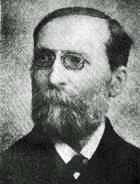
1849-1908
Richard Pischel was a scholar with profound philological knowledge whose works span the field of Indology from ancient to modern times. He was an authority on Prakrit Grammar. He also wrote on Vedic subjects, drama and Buddhism.
Richard Pischel was born on 18.1.1849 in Breslau. He obtained a Ph.D. degree in Breslau in 1870. His thesis, written under the guidance of Stenzler, was De Kalidasae Cakuntali recensionibus ("On the recensions of Kalidasa's Shakuntala"). He compared the so called-Devanagari recension and the Bengali recension, which had been translated by Sir William Jones in 1790 (A year later from English into German by G. Forster). Pischel considered the Bengali version to be the older and more original one. In 1878, Pischel published a critical edition of the Bengali recension.
Pischel first worked in Breslau. In 1875, he was appointed professor of Sanskrit and comparative linguistics in Kiel. In 1885, he went to Halle. In 1902, he held the chair of Indology in Berlin University. In 1908, Pischel, being an authority on Prakrit Grammar, was invited to give lectures at Calcutta. He died in Madras on 26.12.1908,, shortly after he set foot on Indian soil for the first time. Calcutta University honoured him by buying his private library. The Pischel Collection was housed in a special room for reference purposes.
Pischel obtained his qualification as university lecturer by writing De Grammaticis Prakritices ("On Prakrit Grammarians"), Breslau 1874. A treatise Zur Kenntnis der Cauraseni ("On Sauraseni") appeared in E. Kuhn's Beitraege fuer Vergleichende Sprachforschung VIII. Pischel considered Sauraseni to be the principal language of prose writings and Maharashtri the principal language of poetry. Pischel thought that the Prakrit of the dramas should be emended to conform to the rules of the grammarian Vararuci. His views were not accepted by A. Weber and other scholars but he has to be credited for studying Prakrit grammar thoroughly for the first time. From 1877 to 1879 Pischel edited Hemachandra's grammar of the Prakrit languages and his Prakrit dictionary. Pischel's Grammatik der Prakritsprachen ("Grammar of Prakrit Languages") appeared in 1900 in Grundriss der Indo-arischen Philologie undAltertumskunde ("Encyclopedia of Indo-Aryan Research"). Geldner congratulated his friend on the achievement of this monumental work thus, "The long-awaited Prakri Grammar lies before me, the fruit of the work of half your life time.... It: size is greater than all other works published in this series, and its value i; not only above all other contributions, but it surpasses everything that ha: so far been written on Indian grammar...." For this monumental work, Pischel was awarded the Volney prize by the Paris Academy.
When Pischel became Vice-Chancellor of Halle University in 1900, hi gave a lecture on Die Heimat des Puppenspiels ("The Home of Puppetry") Pischel considered India to be the home of puppetry. He thought this was the oldest form of dramatic performances. He deduced this from the fac that puppetteers were referred to as sutradhara in Rajasekhara's 10th century work Balaramayana. Sutradhara is the term used for the producer of a pla since olden times. Pischel also collected references to puppets in Sanskrit literature. He wrote a treatise Das altindische Schattenspiel ("Ancient Indian Shadow Theatre") in the "Proceedings of the Prussian Academy XIII, 1916. He was of the opinion that shadow play existed in ancient India, a view not shared by most scholars at the time. It was only in 1935 when O. Spies actually saw a shadow play performance in India, that the existence of Indian shadow play was recognised by Western scholars.
Two works of Pischel dealt with gypsies Heimat der Zigeuner ("Home c the Gypsies"), 1893 and Beitraege zur Kenntnis der deutschen Zigeuner ("Contributions on German Gypsies"), 1894.
Three volumes of Vedische Studien ("Vedic Studies") appeared in 188S 1897 and 1901 in collaboration with Geldner. Pischel thought that the Vedas could be understood only by persons who had a profound knowledge of Indian thought of the later period. Therefore, he regarded India commentators as indispensable.
When Pischel became professor in Berlin in 1902, the first German expedition to Central Asia had just returned with a wealth of mostly fragmentary manuscripts. Pischel immediately set to work on these Buddhist Sanskrit texts. He also wrote a book Leben und Lehre des Buddha ("Life and Doctrine of the Buddha"). Owing to Pischel's initiative in forming a "Turfan Committee", further expeditions were sent to Central Asia.